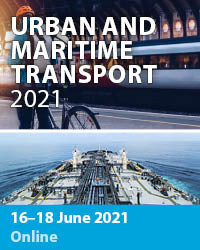
27th International Conference on Urban and Maritime Transport and the Environment
16–18 June 2021
Online
Introduction
The International Conference on Urban Transport and the Environment has successfully been reconvened for 27 years, always attracting a wide international spread of delegates, well established as the premier event of its type.
Meanwhile, the substantial growth of maritime shipping has resulted in large transported quantities around the world, creating a demand for innovative solutions for ports and fleets, well reflected by the success of the First International Conference on Maritime Transport, held in 2019.
These two apparently parallel topics meet in the transport and environmental management of coastal cities, both being affected positively and negatively by landslide and seaside traffic.
The continuing requirement for better urban transport systems and the need for a healthier environment creates a fertile environment for original ideas, innovative approaches and applications of advanced technologies, their tests and evaluations in practice. Moreover, there is a growing need for integration with IT systems and applications to improve safety and efficiency.
Maritime Transport is highly interconnected with rail, road and air services, as well as inland waterways. Each of these must therefore operate complimentary of one another to maximise efficiency and respond rapidly to variable economic and political contingencies.
The variety of topics covered by the conference reflects the complex interaction of the transport systems with their environment and the need to establish integrated strategies. The aim is to arrive at optimal socio-economic solutions while reducing the negative environmental impacts of transportation systems typically by interdisciplinary approaches. Therefore, the conference will focus on multidisciplinary research and development, as well as operational experiences.
The conference started in Southampton in 1995; continuing in Barcelona (1996); Acquasparta, Italy (1997); Lisbon (1998); Rhodes (1999); Cambridge, UK (2000); Lemnos, Greece (2001); Seville (2002); Crete (2003); Dresden (2004); Algarve (2005); WIT Campus in the New Forest (2006); Coimbra (2007); Malta (2008); Bologna (2009); Limassol (2010); Pisa (2011), A Coruña (2012), Kos (2013), Algarve (2014), Valencia (2015), Crete (2016), Rome (2017), Seville (2018), Aveiro (2019) and Bilbao (2020).
All papers are included in the WIT Transactions and archived in the Wessex Institute eLibrary at https://www.witpress.com/elibrary, where they are permanently and easily available to the international community.
Conference Topics
The following list covers some of the topics to be presented at Urban and Maritime Transport 2021. Papers on other subjects related to the objectives of the conference are also welcome.
- Traffic planning, control and management
- Urban and marine policy and governance
- Mobility and public spaces in smart cities
- Logistics and urban freight distribution
- Freight handling and transport
- Positioning, route planning and monitoring, and fleets management
- Public transport systems planning
- Urban vehicle technology
- Naval technology
- Pollution and the protection of the marine environment
- Socio-economic implications and impacts
- Guided transport systems
- Ports and inland waterborne operation
- Impacts on land and coastal use
- Intermodal and multimodal transport systems
- Innovative electric transportation
- Land and marine GIS
- Meteorology and oceanography issues
- Reliability, availability and maintainability
- Safety, security and risk analysis
- Accident analysis and investigations
- Innovative and renewable energy sources, infrastructures and fleets
- Effects of human behaviour on-demand and operation
- Transport system modelling and simulation
- Ro-Ro, Ro-Pax and cruise shipping
- Containers and bulk shipping
- International standards and regulations
- Transportation infrastructure development
- Intelligent and advanced transport systems
- Education and training initiatives
- History of cities and navigation
- Case studies